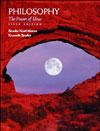| Androgyny | Having both male and female characteristics; unisex.
|
 |
 |
 |
| Anna Doyle Wheeler | An Irish feminist and utilitarian, was a utopian.
|
 |
 |
 |
| Ann Ferguson | Argues that we should pursue a monoandrogynous society to ensure that we are all fully human.
|
 |
 |
 |
| Carol Gilligan | Argues that men and women have characteristically different ways of reasoning about moral issues.
|
 |
 |
 |
| Gender | A person's biological sex as constructed, understood, interpreted, and institutionalized by society.
|
 |
 |
 |
| Gloria Steinem | Helped found Ms. Magazine and brought feminist issues to the public's attention.
|
 |
 |
 |
| Harriet Taylor | A utilitarian philosopher, thought nonphysiological differences between men and women were socially constructed, to the detriment of women and society in general. She was a vociferous proponent of women's suffrage.
|
 |
 |
 |
| Joyce Trebilcot | Holds that the androgynous society should include as many options as possible, including traditionally male types and traditionally female types.
|
 |
 |
 |
| Kate Millett | A contemporary American feminist, argues that patriarchy extends to all areas of life.
|
 |
 |
 |
| Marielouise Janssen-Jurreit | A feminist philosopher in the Marxist tradition, sees women's services involved in childbearing as the first source of "surplus value."
|
 |
 |
 |
| Marilyn Frye | Argues that the concepts of "masculine" and "feminine" are shaped by ideas of dominance and subordination.
|
 |
 |
 |
| Mary Wollstonecraft | A leading early feminist, held that males and females should be educated according to the same standards.
|
 |
 |
 |
| Monoandrogyny | Refers to raising girls and boys exactly the same; there are no gender roles and no concepts of masculine or feminine behavior.
|
 |
 |
 |
| Nancy Chodorow | Argues that the differences between men and women can be traced to the psychodynamics of the nuclear family.
|
 |
 |
 |
| Nel Noddings | A leading exponent of ethics of care.
|
 |
 |
 |
| Polyandrogyny | Refers to raising boys and girls in such a way that they are allowed to choose which gender role they wish to adopt.
|
 |
 |
 |
| Sandra Harding | A feminist epistemologist and philosopher of science, is noted for her feminist analysis of the metaphors of early scientists and philosophers of science.
|
 |
 |
 |
| Sara Ruddick | Holds that the experience of being a mother influences one's moral perceptions.
|
 |
 |
 |
| Sexism | Attitudes and social practices that foster rigid roles based on gender and which tend to work to the detriment of women.
|
 |
 |
 |
| Shulamith Firestone | Argues that new reproductive technologies could free women from oppression.
|
 |
 |
 |
| Simone de Beauvoir | Was a feminist existentialist who extended the discussion of feminism into all areas of intellectual endeavor.
|
 |
 |
 |
| Stephanie Ross | Suggests that the metaphors we use in ordinary speech can shape the way we think about women.
|
 |
 |
 |
| Susan Moller Okin | An important feminist analyst and critic of traditional and recent themes of justice.
|
 |
 |
 |
| Val Plumwood | Finds the inferiorization of women and nature to be linked and grounded in the rationalist conception of human nature and the liberal concept of the individual.
|
 |
 |
 |
| Virtue ethics | Ethical theories according to which what I ought to do is what the virtuous person would do; for virtue ethics, the primary question is, What kind of person ought I to be?
|
 |
 |
 |
| William Thompson | An English liberal, utilitarian, utopian, feminist. An economist, he argued for women's rights and the rights of workers.
|



 2002 McGraw-Hill Higher Education
2002 McGraw-Hill Higher Education